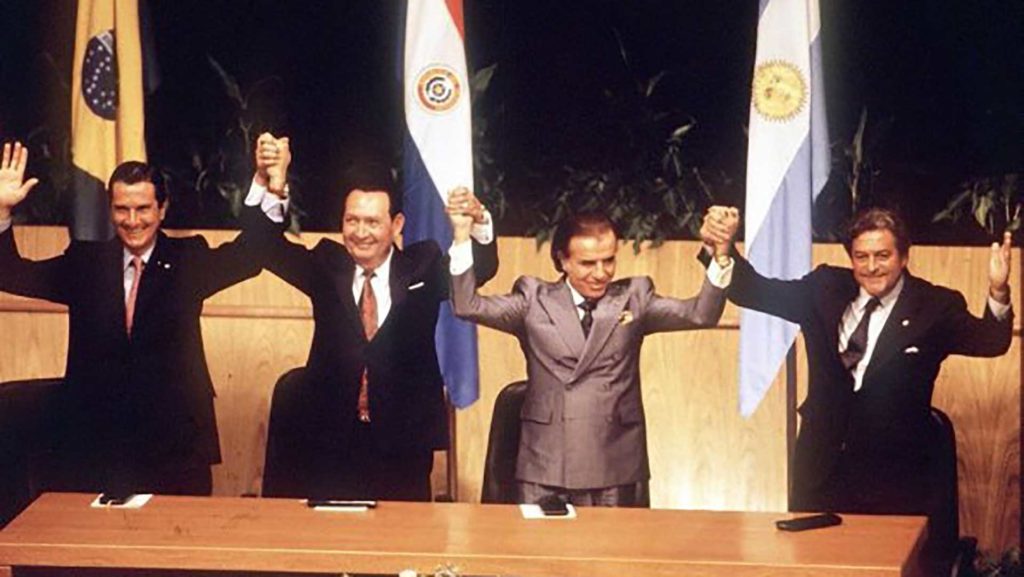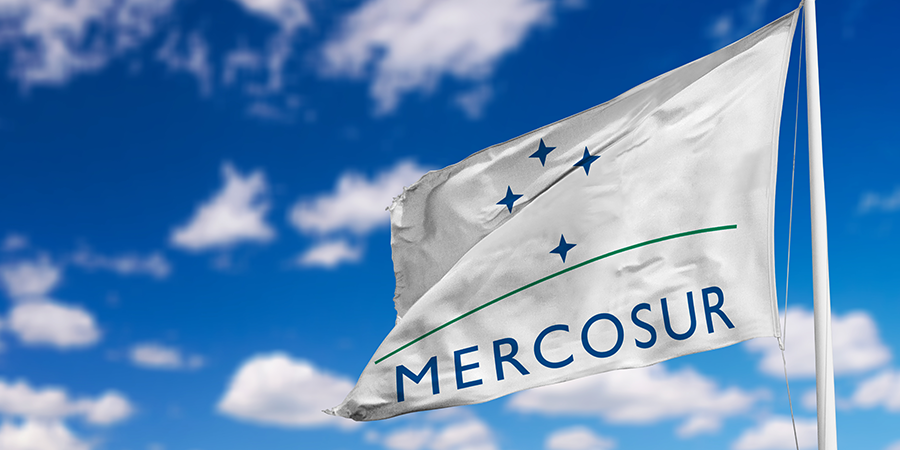The fifth largest economy in the world, the MERCOSUR bloc, in March turned thirty. Today, this integration association exports more than half of the world’s soybean production and is the largest exporter of beef and chicken, corn, coffee and steel. What successes has the MERCOSUR achieved? What is “slowing down” the pace of development of this regional bloc?
El Mercado Común del Sur (MERCOSUR) fue fundado por Argentina, Brasil, Paraguay y Uruguay mediante la firma del Tratado el 26 de marzo de 1991 en Asunción. Desde 1995, la integración se profundizó: la asociación pasó de una zona de libre comercio a una unión aduanera. Actualmente, los miembros asociados de esta organización son la mayoría de los países de América del Sur (Chile, Colombia, Ecuador, Perú, Guyana, Surinam, etc.). México y Nueva Zelanda tienen la condición de observadores.
The creation of the bloc was a historic achievement for the region and became one of the most important events in Latin American integration. The interaction between the participating countries was based on the idea of overcoming the previous logic of rivalry between individual states of the region and establishing dynamic cooperation.
Today, with a population of almost 300 million people and an area of about 15 million square kilometers (50% more than in Europe), the MERCOSUR block is known for its rich natural resources and food potential. The integration association exports 63% of the world’s soybean production and is the largest exporter of beef, chicken, corn, coffee and steel. In addition, the MERCOSUR occupies the eighth position in terms of car production in the world.

The day of the signing of the Treaty of Asunción, creator of the Mercosur, on March 26, 1991. Source: Infobae.
By words of the Argentine Foreign Minister Felipe Solá (Spanish: Felipe Carlos Solá), with a gross domestic product of US $ 4.447 trillion (measured in purchasing power parity) in 2019, according to official figures, the Southern Common Market is fifth largest economy in the world. Over the years, the participating countries have managed to facilitate the exchange of products between the four partners, which has made it possible to intensify the export of products with high added value and create jobs in the industrial sector (biofuels, chemical and petrochemical products, plastics, pharmaceuticals, metallurgy and automotive industries).
Although the clearly defined goals of the MERCOSUR were economic and commercial in its creation, the bloc also plays an important role in strengthening democracy and preventing conflict. As the member countries of the association believe, peace is a necessary condition for development and regional integration. According to the Argentine Foreign Minister Solá, historically, peace is a key component for strengthening the South American region as a zone of calm and cooperation without military or armed conflicts.
The achievements of the Southern Common Market over these three decades does not mean that member countries are not facing a number of challenges. For this reason, the strategic agenda of the MERCOSUR forces states to work to create a common and coordinated policy to develop an overall plan, increase the capacity for the production of goods and services, and create a large-scale and specialized economy. In addition, block members still need to enter global value chains and attract global investment flows more intelligently.
Today the MERCOSUR plays an important role in the international arena. The association countries helps them to defend their positions in a unified manner within the framework of the global agenda in dialogue with the G20, the World Trade Organization, the Food and Agriculture Organization of the United Nations (FAO) and other international blocs and institutions. Reconciliation of the positions expressed by the MERCOSUR becomes even more important against the background of an increasingly complex and fragmented global scenario.

Alberto Fernández at the virtual meeting of the Presidents of the Mercosur, on March 26, 2020. Source: La Nación.
On March 26, 2020, the virtual MERCOSUR Summit was held, within the framework of which the results of the work and progress of the bloc over three decades were summed up. As Interim Chair, Argentina hosted the online meeting, chaired by the President Alberto Fernández (Spanish: Alberto Ángel Fernández) and his colleagues from Brazil, Paraguay, Uruguay, Chile and Bolivia. The last country on this list is in the process of accession. Based on the statement of the Bolivian President Luis Arce Catacora (Spanish: Luis Alberto Arce Catacora), the Latin American state has confirmed its readiness to become a full member of the Southern Common Market. Luis Arce noted that Bolivia has been participating in the association for 24 years as an associate member.
It should be noted that the MERCOSUR has become an important tool for the participating countries, because the political course of the bloc remains unchanged, despite the change of government. Over the past 30 years, common ground has been found on many common goals: commitment to democracy as a basic condition of citizens’ life, respect for human rights as a fundamental and inherent value of coexistence, acceptance of differences and coordination of policies for development in order to unite the productive structures of states.
At this stage, the world is in the process of restructuring the global power structure due to the recent crisis of international institutions that have existed for 70 years. Given the problems and uncertainties that arise in this context, when developing and implementing a common policy, the unification of South American countries will be the best way to promote development, preserve sovereignty, ensure the well-being of peoples and integrate the region into the world.
Nevertheless, it should be borne in mind that COVID-19 has made its own adjustments to the development of integration associations and has become a virus of “discord”. Latin American blocs have not become important actors and instruments in the fight against the pandemic. Various measures were formally taken. For example, in April 2020, the countries participating in the Southern Common Market agreed on an initiative to provide an additional budget of $ 16 million to combat the coronavirus. The announced funds were owned by the Foundation for Structural Convergence of the Mercosur (FOCEM) and are intended to provide medical equipment, personal protective equipment and tests to detect the virus. However, the effectiveness of measures on the part of the MERCOSUR and other organizations in Latin America tended to zero. Undoubtedly, the coronavirus crisis “superimposed” on the current structural problems of the bloc, namely the lack of trust, political differences between the member states, the problem of leadership, the resolution of which still hinders the deepening of the integration association.


